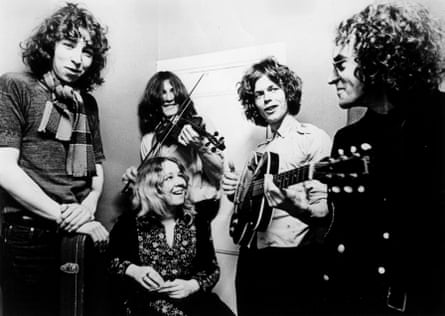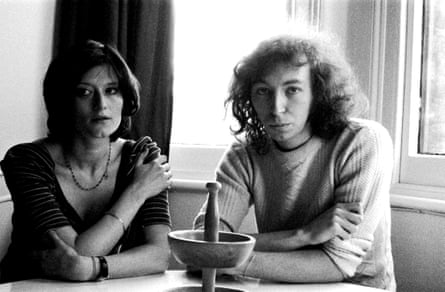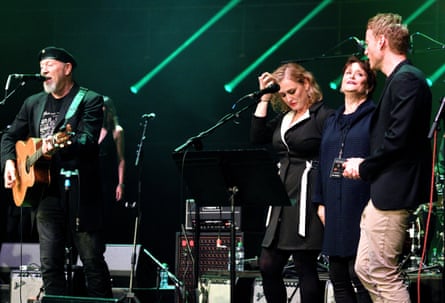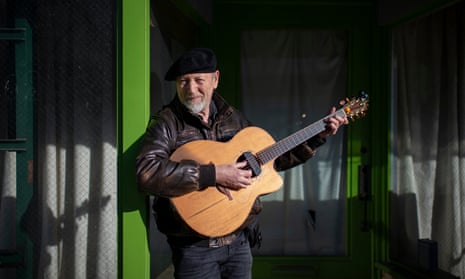It’s nearly 55 years since Richard Thompson began his career in music. A pioneer of folk-rock, hugely influential singer-songwriter and one of Britain’s most astonishing guitarists, he was only a month out of his teens on the morning of 12 May 1969 when all promise was nearly stopped short. His band, Fairport Convention, had been signed on the spot in 1967 when producer Joe Boyd saw his talent with a guitar at 17, and their mission to reconnect British rock with the older, beautiful songs of their home country was well under way.
He’d already jammed with Jimi Hendrix and supported Pink Floyd; now Thompson’s band had recently finished their third album, Unhalfbricking, with singer Sandy Denny. A work full of ambitious originals and covers that still regularly appears in best British album polls, it got to No 12 in the charts then; decades later, it became a touchstone for the Green Man festival-endorsed folk-rock revival of the 2000s when everyone who liked Joanna Newsom and Will Oldham raved about it.
That morning they were driving back to London from a Birmingham gig, approaching the last service station on the M1. Guitarist Simon Nicol was trying to sleep off a migraine, stretched out on top of the speakers in the back. Thompson’s girlfriend, fashion designer Jeannie Franklyn, was asleep. Thompson was dozing between her and roadie Harvey Bramham, who was driving. “It was starting to get light. Nearly dawn…nearly home,” Thompson writes in Beeswing, his forthcoming memoir.
Thompson noticed the van, travelling at 70mph, suddenly veering towards the motorway’s central reservation. In those days there were no crash barriers. He turned his head to Bramham – his eyes were closed. Thompson grabbed the wheel to avoid hitting a pole. The van came off the road.
“The only way I could get through writing about it was to think, ‘This is something that happened to somebody else,’” Thompson says now as we chat on Zoom. “It brought up all kinds of stuff. I had to metaphorically put the pen down, take a deep breath, have a little cry.” In one of the most arresting passages of the book, he describes crawling over to Jeannie a few yards away. He is bleeding, with broken ribs; he finds her upside down on a sloping embankment. “She was unconscious but frowning, as if she was struggling to remember someone’s name,” he writes.
They had been together a fortnight: he didn’t really know her at all, and then she died. Martin Lamble, the band’s 19-year-old drummer, also didn’t survive. Remarkably Nicol got out and walked down the road, flagging down a passing car. He is still the leader of Fairport Convention, 52 years later.

But Thompson left in early 1971, still shell-shocked by the crash, to pursue a solo career that flew well beyond British folk. Ever since, he’s lovingly explored and excavated genres from rockabilly to flamenco, music-hall to pop (2003’s 1,000 Years of Popular Music did all this in one album, moving from 13th-century ballad Sumer Is Icumen In to Britney Spears’s Oops!… I Did It Again). A favourite of both Robert Plant and Elvis Costello, Thompson has also been covered by acts as varied as feminist punks Sleater-Kinney, REM, David Byrne and, most recently, Mark Ronson, who covered the 1974 title track of Thompson’s album with first wife Linda Thompson, I Want to See the Bright Lights Tonight. Ronson tweeted how much the song had given him comfort during lockdown. “It’s the ultimate song about a messy weekend night out… I miss that all very much.”
That period of Thompson’s career is especially rich: he met Linda in 1969, and they married in 1972, then made fantastic music together for the next decade. Linda is one of Britain’s greatest, but most overlooked, singers, possessed of a bold, beautiful voice that carried the songs Richard wrote for her, and accompanied dramatically with his guitar. Their story outside music is dramatic too. It involves Richard’s conversion to Sufism, a move with their two young children to a rural commune without hot water and electricity, subsequent adultery during pregnancy, and a traumatic tour after their breakup where Linda kicked Richard in the shins while he played guitar solos (it’s known by their fans as The Tour from Hell).
Thompson is still a restlessly curious, active musician, and a raucous one live: his shows often have the power and fervour of Nick Cave and the Bad Seeds. He’s worked with Werner Herzog and Wilco’s Jeff Tweedy, and kept busy in the pandemic, releasing two EPs (Bloody Noses and Live from London), and doing live streams from home for the Royal Albert Hall. An eight-CD box set compilation of all his work, including demos and rarities, with Linda, Hard Luck Stories, was released in October; he also recorded a Christmas message for his local venue wearing a Santa hat. But most of last year was spent finishing the book he’d said he’d never write.
When we speak, he’s midway through recording the audiobook, and recently had to read the chapter about that May morning. He speaks softly. “We never mourned properly. There wasn’t the language then to describe those feelings. I’m still learning.”
We are talking on a freezing late winter day. He is in Montclair, New Jersey, enduring the aftermath of a snowstorm that buckled the east coast of North American having spent three days digging out his car. “I’ve never seen so much snow in my life – my God! The weather’s shit!” he laughs. He sits in a pale-walled living room with a 1930s London Transport poster above him which speaks of the gentility of the suburbs. He wears a slightly groovy grey hoodie and a baseball cap, not his trademark onstage beret. His beard may be white but his blue eyes are lively, as is his wit.
It may be surprising that the great man of British folk-rock has lived in America for the past 30 years. Women took him there: his second wife, Nancy Covey, booked his first solo tour in the US in 1981 as his marriage to Linda was crumbling. He lived with her in LA; now he’s with singer-songwriter Zara Phillips, 56, who lives around the corner (she often pops up in his online shows: they share a love of Kate Bush).
Thompson loves America’s generosity of spirit, its get-up-and-go. “In the US, if you say, ‘I want to start a company,’ they’ll say, ‘Great, let’s get on this!’ In Britain, they’ll say, ‘Oh, I wouldn’t do that, no, the computer says no’.” How does it feel after Trump? “It’s a relief to get rid of the Orange One and get back to real life, to hear politicians actually say things they might mean. It’s incredible, to be honest. But America is a strange country, one that’s never quite seemed to recover from the civil war, and I think we’re still feeling the repercussions of that today.”
Thompson was born in London in 1949, the younger child by five years to big sister, Perri (who became and still is a fashion designer). He’d hear her Buddy Holly and Elvis records through the bedroom wall, and smell her Gauloise cigarettes. His housewife mother looked and sang like Vera Lynn. His dad was a tough Scot who worked for the special investigation branch in the army. “His job was a bit like Carol Reed’s Third Man: a lot of contraband and rounding up Nazis. I’ve spent the rest of my life intimidated by authority. That comes from having a very stern father who could whack you at any moment.”
His parents were still asking Thompson when he was going to get a proper job when he was in his 40s; it’s ironic, then, that his dad’s collection of guitar 78s gave his son a means of escape. Thompson writes romantically about hearing Django Reinhardt, Lonnie Johnson and Les Paul as a young boy, “lying on a sea-green shag-pile rug in the living room with my ear a foot from the radiogram speaker”. At 11, he started learning the guitar, and he found it helped him communicate. He had a stutter as a child, which he thinks might have been linked to the fear of his father. His music teacher called him a “musical no-hoper” in a school report (Thompson could never manage to read music; he’s long suspected that he’s dyslexic).

Hugh Cornwell, former frontman of the Stranglers, also makes an appearance in the book’s early pages. They were close friends at William Ellis boys’ school in Highgate, and played in a band called Emil and the Detectives at local parties and clubs. Thompson doesn’t mention in the book that they supported Helen Shapiro at the Golders Green Iconic, or that he taught Cornwell to play bass. “I’m indebted to Richard for what I did with my life,” Cornwell tells me. They would walk to and from school together, planning what seven-inches they would buy with their pocket money. He remembers sitting in Thompson’s living room one afternoon in 1964, hearing the Rolling Stones’ Not Fade Away for the first time.
“He was a music obsessive,” Cornwell says. “I remember music manuscript sheets everywhere.” They lost touch when Thompson didn’t return to school after the summer holidays, he adds, “as people did in those days”. They next saw each other 43 years later at a festival in Spain: Cornwell had seen his friend live a few times, but not been brave enough to go backstage. There were bearhugs that night. They’re now regularly in touch.
The progression of Thompson’s swinging 60s adventures in Beeswing often feels Forrest Gump-like. Here he is on the edges: at the famed 14 Hour Technicolor Dream event in Alexandra Palace 1967, watching Yoko Ono’s performance art as John Lennon wanders around. He sneaks a look at Joni Mitchell’s lyrics notebook, walks in on Keith Richards overdubbing Sympathy for the Devil, and writes tenderly of Nick Drake: he played on two of his best-known songs, Hazey Jane II and Time Has Told Me.
He recalls hearing tracks from Drake’s last album, Pink Moon, early on, and being disturbed by their pain; his subsequent death shook Thompson badly. So did Sandy Denny’s in 1978, his old bandmate in Fairport Convention. Her gorgeous vocals lifted Thompson’s stunning early compositions, like Unhalfbricking’s opener Genesis Hall, and Meet on the Ledge, a song about the passing of time. Denny’s empathy and sensitivity in her own artistry meant she had a “missing layer of skin”, Thompson writes. Alcoholism and mental health issues unravelled her in the years before her death. He went to pay his respects to her at the morgue after she died. “I did not get the sense that she was at peace,” he notes.
Thompson also writes about the band sacking her, which he deeply regrets, after they made Liege and Lief, soon after the crash (a detail that will be a revelation for fans). There are many women in the book, although their experiences feel marginal to the main narrative. Were women sidelined back then in some ways? “If I could pick on a fault of my youth, it was the fact that I would kind of steamroller over women who didn’t have that strength. But I was always drawn to women who can stand up for themselves.” We discuss some the women who’ve made a mark on his life: Shirley Collins, with whom he’s played and toured (“an extraordinary woman”) and Liz Gordon, an American tour booker with whom he had a brief relationship in 1971: she asked him to get her pregnant, as she wanted a child (she told him she was happy to be a single parent).
Thompson writes that he neglected their son Jesse for years, that he was “immature and irresponsible”; father and son get on well now, he says.
And then there is Linda. She first appears in the book during the sessions for Fairport Convention’s Liege & Lief, the ambitious traditional music project they threw themselves into after the crash. He writes about her tenderly. “She was resplendent in white,” he says of their 1972 wedding day (he was less resplendent, wearing clogs, as he couldn’t find his shoes thanks to a post-stag-night hangover).
The songs he “wrote for Linda,” he says, “are precious to me”. They include some of the most touching songs ever committed to record, such as Dimming of the Day/Dargai, a clarion call to tumultuous love (also covered by Alison Krauss, Tom Jones and the Corrs), and Withered and Died, a song that feels steeped in centuries of heartache (memorably covered by Elvis Costello).
The book ends in the mid-1970s, after Thompson converts to Sufism, living a stripped-down life, even getting rid of his furniture at one point. I note Thompson now has a sofa – he smiles – but he still prays every day at set times, observes Ramadan, pays the zakat: “I just do the same things that a quarter of people in the world do.” Islam is like a grid for him that he sits upon each day. It stopped him drinking, gave him peace. It continues to.
The Tour from Hell with Linda, however, is not mentioned in the book. Neither is the fact that she was pregnant with their youngest daughter, Kami, when she found out about Thompson’s infidelity. (Kami is now long into her own husband-and-wife duo, the Rails, with James Walbourne.) The album the Thompsons were touring, Shoot Out the Lights , was big on US college rock radio, its songs brilliant and tough (titles like Walking on a Wire and Did She Jump Or Was She Pushed? spoke volumes). REM would later cover its closer, Wall of Death. It was expected that Linda wouldn’t do the tour after the couple split. Joe Boyd – who had been Linda’s boyfriend before Richard, and who had got back together with his friends to produce Shoot Out the Lights – knew her better: “She said to me, ‘I’ve lost a husband, I’m fucked if I’ll lose the tour as well.’”
Boyd tells me of one gig in LA where Carly Simon, Linda Ronstadt and Maria Muldaur were in the front row to support her, holding hands. “She sang every lyric straight at them,” Boyd says. Why stop the book at 1975, I ask Thompson. He talks about getting bored of books by Pete Townshend and Keith Richards when they go past the early years: “Once you’re playing Scunthorpe for the 30th time, unless someone gets murdered in the audience, it’s not that interesting.”
But why leave out the tour? “That tour could be another book,” he says, cautiously. Does he want to write about it? “Um… well, it’s painful. Lots of the stuff in the book is.” Did he play his cards close to his chest so as not to upset the family? “No!” He laughs. He mentions that Nick Hornby was interested in turning the tour into a film script “about a decade ago… The kids were all for it.”
He and Linda have been friends now, for “10, 15 years” he adds. In 2014, they even made an album, Family, together with their children Teddy and Kami, among others. On a video trailer for it, Teddy jokes about how the gang can’t wait to reunite. “In fact my mum and dad might get back together,” he says. His mother howls next to him. “They might fall in love again on the road!”
When a friend passes Linda’s email address on to me, I nervously message her about the book. She’s delightful. She replies she’s not surprised that it’s not a confessional: “Not his style.” Richard has spoken to her about it, she adds, and he says she comes out of it well. “But coming out of it as a mad virago would have been just as good,” she adds, impishly.
The past is forgiven for her, she explains. “Working with a husband or wife is tricky.” So is the way women fell by the wayside back then. “Those were different times. So often we acquiesced to things we shouldn’t have.” She’s keen to read Beeswing for a different reason. “I’m dying to know if he’s as good a book writer as he is a songwriter.”

Thompson himself is happy it’s done. He’s back doing the day job, getting up every day at seven to write songs (sometimes he finishes at noon, sometimes he works late into the night). He is nervous about the future of the music industry, given the pandemic and Brexit, and the UK touring visa situation is a particular bugbear. “Music is one of our greatest exports. It’s just terrible that our political leaders could have negotiated something so disastrous.” He doesn’t know if he’ll be able to tour Europe with a band again given the costs. “I might just have to play solo, which would be a tough choice.”
Live music needs to happen, he continues, “otherwise, as a human race, we will go extinct”. It’s hyperbolic but he means it. “Music is so great for kids. It makes you cleverer at everything else, and also teaches you to go past a mistake. If you make one [when you play live], you can’t burst into tears and stop. You just have to carry on.”
He mentions how the classical pianist Arthur Rubenstein would prefer the emotion he would put into a particular performance that included mistakes. “There’s a good lesson in there,” he says. “You can pass a mistake, learn, and get on with life.”
Beeswing: Fairport, Folk-Rock and Finding My Voice by Richard Thompson is published by Faber on 15 April (£20). To order a copy for £17.40 go to guardianbookshop.com. Delivery charges may apply
This piece was edited on 15 March 2021 to show that Sandy Denny was sacked after Fairport Convention recorded Liege and Lief, after the M1 crash

Comments (…)
Sign in or create your Guardian account to join the discussion